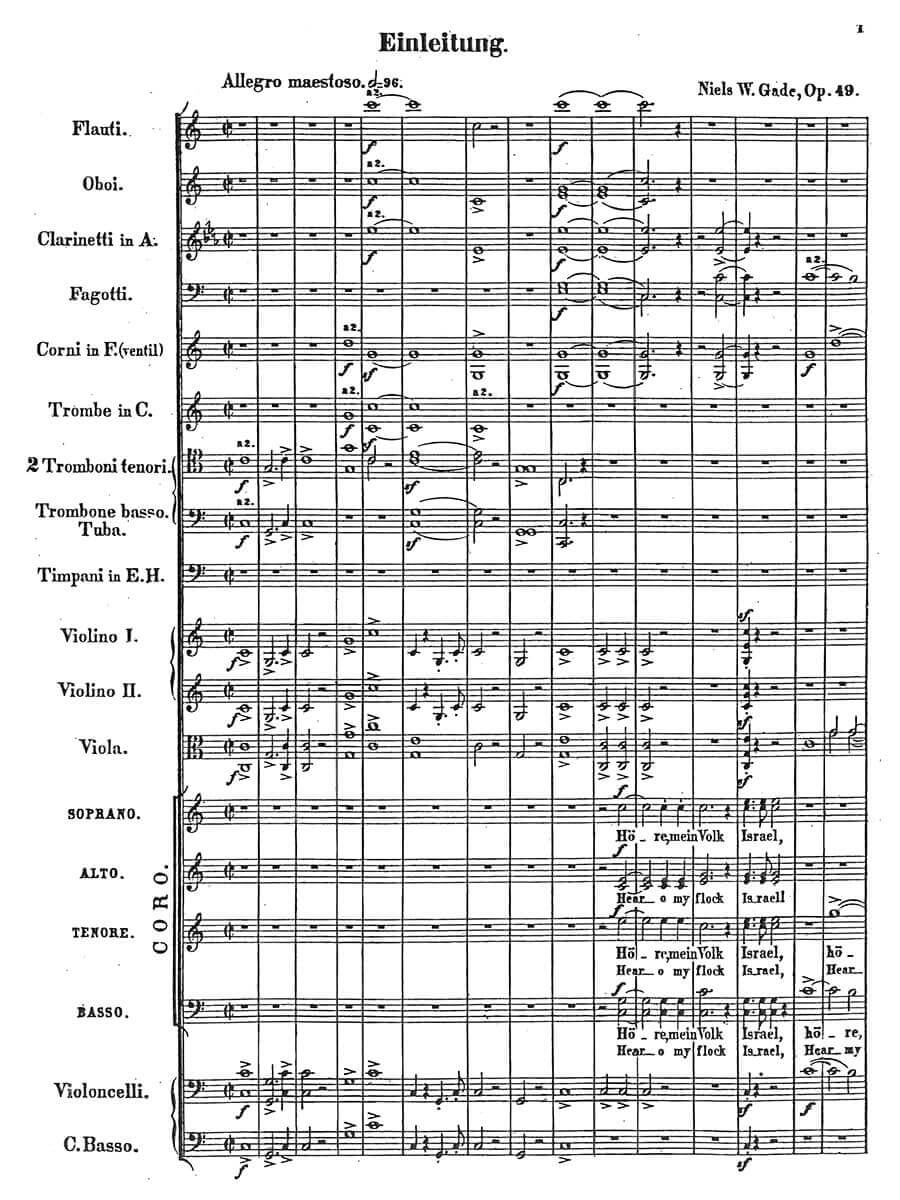Zion Op. 49, Concertante piece for choir, baritone solo and orchestra
Gade, Niels Wilhelm
25,00 €
Preface
Niels Gade
(b. Copenhagen, 22 February1817 – d. Copenhagen, 21 December 1890)
Zion, Op.49
Preface (by Joseph Morgan, 2017)
Born in Copenhagen, 1817, Niels Gade showed extensive musical talent at an early age; enough talent that his musician parents directed him towards his studies in music instead of his father’s trade in cabinet making. By 16 he had made his professional debut as a violinist and joined the Royal Orchestra in 1834. He spent the rest of the decade developing his compositional voice, specializing in songs and chamber music as well as orchestral overtures emphasizing a Nordic influence in his melodic style. In 1840, his Efterklange af Ossian (‘Echoes of Ossian’) won the a competition at the Copenhagen Music Society. However, his first Symphony from 1842 was not accepted for performance. In response, he sent it along to Felix Mendelssohn in Leipzig. Mendelssohn performed it there to acclaim and shortly after Gade joined him in Leipzig, obtaining an assistant conductor position at the prestigious Gewandhaus Orchestra and a teaching post at the Leipzig Conservatory. From this moment on Gade’s catalogue was clearly influenced by Mendelssohn’s romantic language, taking on what has been seen as an international idiom.
In 1847, after Mendelssohn’s death, Gade was appointed as Chief Conductor but was forced to return to Copenhagen in 1848, when war broke out between Denmark and Prussia. Upon his return he reorganized the Musical Society there and established a permanent orchestra and chorus, raising Copenhagen’s concert culture to international status with performances of many masterworks including Ludwig van Beethoven’s Ninth Symphony and Johann Sebastian Bach’s St. Matthew Passion as well as his own works. His eight symphonies hold the primary place in his catalogue. While the first is clearly inspired by Nordic melodies the remaining symphonies proceed away from this towards a language that is ever more serious and personal even as it is less nationalistic. His Elverskud (‘The Elf-King’s Daughter’) of 1854, derived from a Danish folk-ballad of the same name, is perhaps Gade’s most overtly nationalist work.
His later canata Zion from 1874, and included in the present edition, is in a much more international style, faced difficulty getting performed in Copenhagen. In 1876 the Musical Festival Committee of Birmingham approached Gade to compose a work for that summer’s festival and to conduct the premiere. Zion, with its Handelian emphasis on the sacred, it’s text derived from selected texts from the Old Testament, and instrumentation, written for baritone soloist, choir and orchestra, fit the bill perfectly. Its premiere at the festival on August 30th, 1876 was a complete success, causing Gade to write to his wife: “I had not at all expected that great a success with Zion, since it is solemn and not quite easy to get at. But I assume that the powerful [content] has made its effect.”
Divided into an Introduction and three parts titled: “The Departure from Egypt,” “The Captivity in Babylon,” and …
Read full preface > HERE
Score Data
| Edition | Repertoire Explorer |
|---|---|
| Genre | Choir/Voice & Orchestra |
| Size | 210 x 297 mm |
| Printing | Reprint |
| Pages | 90 |
